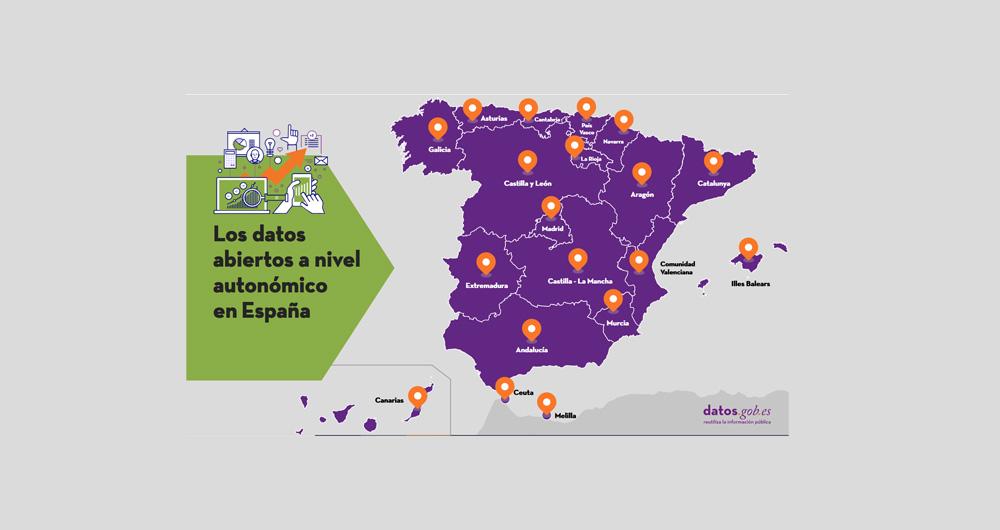
At the end of last year, the IV Open Government Plan for Spain was published, which included a series of commitments that public administrations undertook related to accountability, improved participation or open data and the reuse of public information, among other aspects. The objective: to contribute to a fairer, more peaceful and inclusive society.
In this article we will review the strategies linked to open data of the Autonomous Communities and the commitments made in this plan.
Andalusia
The Junta de Andalucía's open data portal has 4 objectives: Transparency; Innovation and economic growth; Efficiency and effectiveness of the administration; and Inclusion and empowerment of citizens. Its actions are framed within the Junta de Andalucía's Open Government Action Plan.
Its future plans are the implementation of formalised openness mechanisms, both technical and organisational. High-value datasets will be selected, common vocabularies will be defined and permanent contact will be established with the community of re-users to encourage re-use. Methodologies and processes for data-driven decision making will also be enabled, and a training plan on Open Government and open data will be carried out, especially targeting administration staff.
Asturias
The data catalogue of the Principality of Asturias is integrated in its Open Government area and its activity is framed within the Law of the Principality of Asturias 8/2018, of 14 September, on Transparency, Good Governance and Interest Groups.
The Asturian Government has committed, in the IV Open Government Plan, to the elaboration of the Strategic Transparency Plan of the Principality of Asturias (PETPA) with measures that contribute to the compliance with the Asturian Law 8/2018. This Plan will also include mechanisms for training, awareness-raising, participation, monitoring, control and evaluation in the field of Transparency.
Aragon
The Aragon Open Data Strategy focuses on two pillars. On the one hand, promoting interoperability, through the Interoperable Information Structure of Aragon EI2A. On the other hand, active listening, with actions such as Aragon Open Data Focus, aimed at getting to know publishers and users of open data better (more information in this interview). In their strategy they propose a model and a roadmap defining the mission, vision and values of Aragón Open Data:
- Mission: to be the catalogue from which citizens and companies can access the set of open data offered by the Government of Aragon and other institutions.
- Vision: to provide a treatment of information systems that not only generates wealth, but also develops and consolidates the infomediary sector to improve the social and economic development of the region.
- Values: quality, interoperability, participation, coordination, collaboration, transparency and accessibility.
Canary Islands
The Canary Islands have committed to centralising the public data of the different administrations of the islands in a single access point (called Canarias Datos abiertos), with the aim of improving the location and accessibility of the information, applying processes of standardisation of formats and ensuring interoperability, among other reasons.
Its commitments also include promoting participation, through a Canary Islands Open Government Network as a meeting point for the bodies of the Canary Islands Public Administration. All of this will be reflected in the Open Government Strategy for the Canarian Agenda for Sustainable Development 2030, recently presented.
Castilla y León
Castilla y León is a very active region in the open data ecosystem, with a special focus on dissemination and awareness-raising. It is currently running the fifth edition of its open data competition to promote the reuse of its datasets.
In the IV Open Government Plan, they are committed to approving a new law and drawing up a catalogue of public information, already approved, where the commitment of each organ, body and public entity of the regional public sector is materialised. The aim is to increase the volume of relevant, clear and structured public information to be actively disseminated.
Castilla y León is drafting the new Law on Transparency, access to public information and its reuse, which includes the so-called "Open Data clause": any IT development, whether carried out with its own or external resources, must facilitate the extraction of the information collected, recorded or collected in reusable formats.
Castilla - La Macha
The "Open Data of Castilla-La Mancha" space is the result of Law 4/2016, of 15 December, on Transparency and Good Governance of Castilla-La Mancha. Castilla-La Mancha's strategy has focused on constant openness and training. Since 2017, a Training Plan has been approved which includes specific courses on open data and reuse of information aimed at public employees. In addition, through a collaboration agreement with the University of Castilla-La Mancha, the Specialisation Course in Open Government (previously called Transparency and Access to Public Information) is being developed, which includes, among others, the subjects of access, open data and reuse of public information.
Among the objectives to be addressed in the coming months is the development of an improvement plan for its Open Data space, which will include advances in the visualisation of information, the incorporation of high-value data and data governance, among other issues.
Cantabria
Cantabria does not have a centralised open data portal for the whole territory, although we can find the ICANE (Cantabrian Institute of Statistics) open data space focused on the opening and reuse of statistical data. They also offer the possibility of downloading cartographies and geographic information from their geographic viewer.
In the 4th Open Government Plan, they have focused on the area of citizen participation, committing themselves to drafting a new law that establishes the material channels and provides information and knowledge to citizens, with the aim of motivating their participation. Until now, the regulatory framework in this area has been marked by Law 1/2018, of 21 March, on Transparency in Public Activity.
Catalonia
The Government of Catalonia is committed to citizen participation. Its open data strategy has been closely linked to contact with society and the business world, through different actions such as the "Café amb Dades" information sessions.
In the IV Open Government Plan, they committed to creating a virtual meeting place for all the actors working in the field of citizen participation: ParticipaCatalunya.cat, which is already operational. They also plan to build a space for citizen participation to supervise the Generalitat's anti-corruption strategy, as well as to prioritise the opening of public information related to gender inequality, in order to facilitate the monitoring and evaluation of the impact of public policies on equality. For the time being, they are working under the umbrella of their Open Government Plan 2019-2020, which was extended last year.
Extremadura
Within the area of citizen participation and transparency of the Regional Government of Extremadura we find its catalogue of publications, the result of the law 4/2013, of 21 May, on Open Government of Extremadura, which guarantees the right of access to public information. Its strategy also includes the Digital Modernisation Plan 2020-2024 of the Regional Government of Extremadura, which includes, among its priorities, data orientation, promoting its cataloguing and reuse by proactively facilitating its accessibility and usability. Likewise, transparency is one of the ten principles that should guide the performance of the plan and, ultimately, the functioning of the Administration in this scenario of Digital Transformation.
Extremadura's commitments in the IV Open Government Plan are related to the simplification of the right of access to public information and the reduction of response times to the interested party's request, as well as to increasing the level of citizen satisfaction in access to public services, promoting their accessibility and usability through the redesign of processes.
Galicia
In the strategy of the Open Data initiative of Galicia, Abert@s, the importance of internal dissemination stands out, encouraging the participation of all areas in the publication of data, and the promotion of reuse. Its actions are carried out under the umbrella of Law 1/2016, of 18 January, on transparency and good governance.
Galicia's commitments in the IV Open Government Plan are related to improving the Galician government's decision-making, enhancing citizen participation and the automation of administrative procedures, as well as boosting accessibility in the Xunta de Galicia's Transparency and Open Government Portal. They also want to improve the quality of information and promote the publication of content in reusable formats, among others.
Balearic Islands
The regulatory framework for Open Data in the Balearic Islands is Law 4/2011, of 31 March, on good administration and good government in the Balearic Islands, although the agreement that gave rise to its open data portal dates from a month earlier.
The Gobern's commitments on open government have mainly to do with training and regulation. On the one hand, they will carry out training activities aimed at public employees on open government, including open data. On the other hand, they will approve a new Transparency Law and a decree determining the organisation of transparency. The IV Open Government Plan includes more commitments, such as the creation of a platform for citizen participation and the development of an evaluability study to include monitoring indicators in public policies.
La Rioja
The open data portal of La Rioja responds to 2 laws: Law 3/2014, of 11 September, on Transparency and Good Governance of La Rioja and Decree 19/2013, of 31 May, which regulates the reuse of information in the Public Sector of the Autonomous Community of La Rioja.
Those responsible have committed to improving access to information on this portal, as well as on the Transparency Portal and the institutional website. The aim is to integrate, unify, publish, link and exploit the existing information in all of them, in a more efficient way. The development of a new website that is simpler, smarter and more efficient in terms of locating and reusing content will be promoted. Actions will also be developed to improve active publicity and the evaluation of the results of the plans and programmes.
Community of Madrid
The data portal of the Community of Madrid was launched in 2019, the same year as its Law 10/2019, of 10 April, on Transparency and Participation of the Community of Madrid. Since then, its portal has continued to grow, incorporating new datasets and sections aimed at reusers.
In the IV Open Government Plan, the Regional Government of Madrid highlights the importance of communication. It is committed to providing citizens with information in a simple, clear and effective way, so that they can interact more easily with the administration. As a background, they have already worked on a Clear Communication Guide that they want to extend to the field of transparency and citizen information.
Region of Murcia
The CARM has had an open data portal since 2014 and an open data strategy since 2016, which sets as one of its objectives the generation of value through the use of open data. The Regional Administration has included this policy in its Transparency and Open Government Portal, with the aim of aligning both strategies.
The commitments made by the CARM in the IV Open Government Plan are more closely linked to its Public Governance Strategy. Among the measures to be promoted is the creation of a framework for Institutional Integrity, including codes of conduct and training, dissemination and promotion actions, among others, as well as a Register of Interest Groups. Child and youth participation in the design of public policies will also be promoted through workshops.
Navarre
The open data portal of Navarre responds to the Foral Law 5/2018, of 17 May, on Transparency, Access to Public Information and Good Governance. Work is currently being carried out on the integration of geographical data, which can be found in the Spatial Data Infrastructure of Navarre, and on the integration of a greater number of local entities.
Navarre wants to promote the use of open data on its portal, and therefore undertakes to publish datasets that are of greater interest for the reuse of public sector information and to improve the design and content of the Open Data space. It will incorporate data generated by (NA)SAT and will collaborate with the infomediary sector to identify data of greater interest. Among its objectives is also the federation of Open Data Navarra with broader open data catalogues, such as datos.gob.es.
Valencian Community
The opening and reuse of data is one of the strategic lines included in the Generalitat Valenciana's Biennial Transparency Plan. Although its open data portal dates back to 2016, a new version was launched in 2020, with a change of conception: they have gone from a data repository to a space open to the community of reusers.
In the coming months, Valencia will develop and implement an open data strategy in Valencian public administrations so that the data generated are open and reusable by default. The aim is to promote reuse, accountability and data-driven decision-making, among others. The Generalitat is also promoting instruments for better data management, such as the Artificial Intelligence Strategy for the Valencian Region, and is committed to a collaborative budgeting project, as well as to institutionalising public ethics.
Basque Country
The Open Data Euskadi portal was a pioneer in our country, dating back to 2009. The promotion of open data and the encouragement of its reuse is the responsibility of the Directorate for Citizen Services and Digital Services, as stated in its structural decree. Some of its latest projects are the new Euskalmet website, created with open data, the creation of various open data APIs (traffic, cultural events, etc.) and its Open Data Competitions.
Its commitment is to work together with the main Basque administrations to identify sets of data demanded by the group of reusers in the Basque Country and by citizens, and to standardise and link this data, developing inter-institutional visualisations and services. All of this is accompanied by a participation and communication plan in terms of social auditing, as set out in its Action Plan for Open Government in the Basque Country 2021-2024.
Ceuta and Melilla
The autonomous cities of Ceuta and Melilla, although they do not have open portals yet, have also included commitments in the plan. Ceuta is committed to launching a transparency portal and developing regulations in this area, among other issues. Melilla, for its part, has focused on training and will carry out programmes on youth participation in public management.
In short, all the administrations are working to continue promoting access to information, citizen participation and the reuse of public data.


